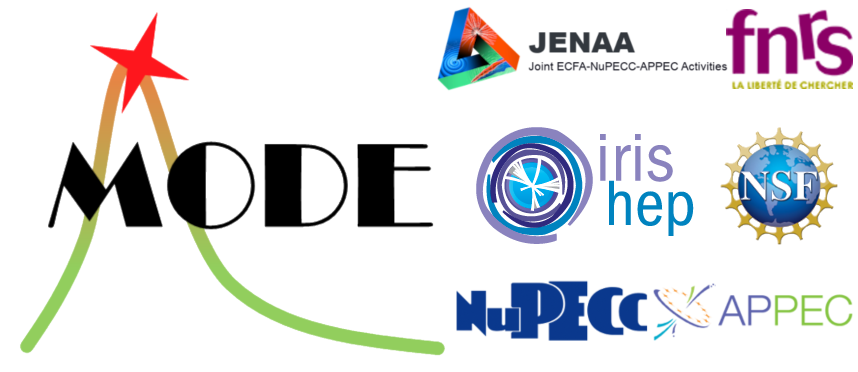Conveners
Methods and tools
- Lisa Kusch (TU Eindhoven)
Methods and tools
- Long Chen (RPTU Kaiserslautern-Landau)
Methods and tools
- Nicolas Gauger (University of Kaiserslautern-Landau (RPTU))
-
Mohamed Aly (Princeton University (US))09/06/2025, 16:00Methods and toolsTalk
Using tooling from the Scikit-HEP ecosystem we implement differentiable analysis pipelines for representative HEP analysis use cases and provide complimentary examples to the IRIS-HEP Analysis Grand Challenge. This presentation details the process and related development work and covers the example workflows that...
Go to contribution page -
Jeffrey Krupa (SLAC)09/06/2025, 16:30Methods and toolsTalk
Applying automatic differentiation (AD) to particle simulations such as Geant4 opens the possibility of addressing optimization tasks in high energy physics, such as guiding detector design and parameter fitting, with powerful gradient-based optimization methods. In this talk, we refine our previous work on differentiable simulation with Geant by incorporating multiple coulomb scattering into...
Go to contribution page -
Carlos Ruiz Gonzalez09/06/2025, 17:00Methods and toolsTalk
Historically driven by expert knowledge and intuition, experiment design is nowadays (partially) automated by software able to simulate and optimize the properties of complex setups. Beyond tinkering with some parameters, current tools can navigate a vast space of configurations. Gravitational wave detectors, the focus of this work, are a good example, as they can be encoded in a...
Go to contribution page -
Vassil Vasilev (Princeton University (US))10/06/2025, 12:00Methods and toolsTalk
RooFit's integration with the Clad infrastructure has introduced automatic differentiation (AD), leading to significant speedups and driving major improvements in its minimization framework. Besides, the AD integration has also inspired several optimizations and simplifications of key RooFit components in general. The AD framework in RooFit is designed to be extensible, providing all necessary...
Go to contribution page -
Christina Koutsou (Princeton University (US))10/06/2025, 12:30Methods and toolsTalk
GPUs have become increasingly popular for their ability to perform parallel operations efficiently, driving interest in General-Purpose GPU Programming. Scientific computing, in particular, stands to benefit greatly from these capabilities. However, parallel programming systems such as CUDA introduce challenges for code transformation tools due to their reliance on low-level hardware...
Go to contribution page -
Samuele Grossi (Università degli studi di Genova & INFN sezione di Genova)11/06/2025, 09:00Methods and toolsTalk
Deep generative models have become powerful tools for alleviating the computational burden of traditional Monte Carlo generators in producing high-dimensional synthetic data. However, validating these models remains challenging, especially in scientific domains requiring high precision, such as particle physics. Two-sample hypothesis testing offers a principled framework to address this task....
Go to contribution page -
Stephen Casey (University of Miami)11/06/2025, 09:30Methods and toolsTalk
This presentation will describe a method to discover the governing equations in physical systems with multiple regimes and lengthscales, using minimum entropy criteria to optimize results. The historically challenging problem of turbulent flow is used as an example, infamous for its half-ordered, half-chaotic behavior across several orders of magnitude. Exact solutions to the Navier-Stokes...
Go to contribution page -
Saransh Chopra (Princeton University (US))11/06/2025, 10:00Methods and toolsTalk
Modern scientific computing often involves nested and variable-length data structures, which pose challenges for automatic differentiation (AD). Awkward Array is a library for manipulating irregular data and its integration with JAX enables forward and reverse mode AD on irregular data. Several Python libraries, such as PyTorch, TensorFlow, and Zarr, offer variations of ragged data structures,...
Go to contribution page
